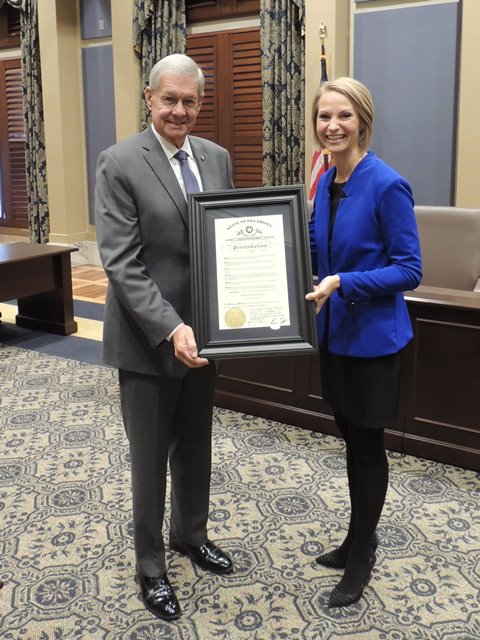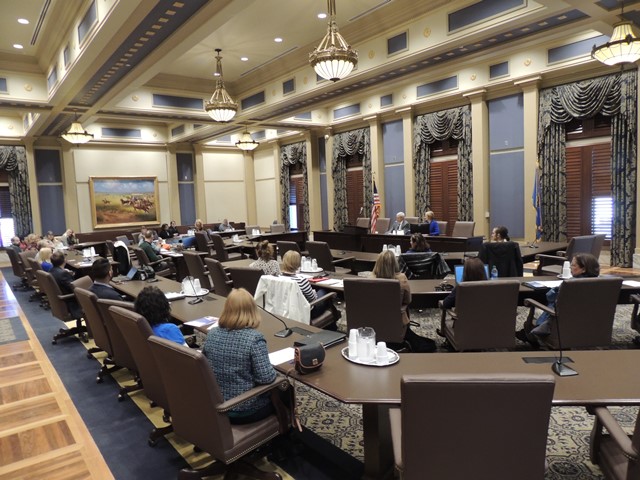In order to provide equal access and equal opportunity to people with diverse abilities, this site has been designed with accessibility in mind. Click here to view
Legislative Diabetes Caucus announces 2020 agenda
 Legislative Diabetes Caucus Co-Chairs Sen. Frank Simpson and Sen. Carri Hicks shared a proclamation signed by Gov. Kevin Stitt naming November as Diabetes Awareness Month in Oklahoma.
Legislative Diabetes Caucus Co-Chairs Sen. Frank Simpson and Sen. Carri Hicks shared a proclamation signed by Gov. Kevin Stitt naming November as Diabetes Awareness Month in Oklahoma.
 The Legislative Diabetes Caucus announced their 2020 agenda Friday at the state Capitol.
The Legislative Diabetes Caucus announced their 2020 agenda Friday at the state Capitol.
November is World Diabetes Month, and the Oklahoma Legislative Diabetes Caucus is gearing up to continue their fight against the disease that affects 414 million or one in eleven people worldwide with at least half being undiagnosed. On Friday, co-chairs Sen. Frank Simpson, R-Springer, and Sen. Carri Hicks, D-Oklahoma City, along with other members of the bipartisan caucus announced their 2020 agenda focused on creating new partnerships, improving education and training, encouraging more activity in schools and taking legislative action to help Oklahoma’s diabetic and prediabetic citizens.
Simpson said he was pleased with strides made statewide in recent years to better educate citizens on managing and preventing diabetes but knows more must be done given Oklahoma’s high rate of diabetes.
“Oklahoma has many state and tribal agencies, nonprofits, medical institutions and other resources working tirelessly to fight diabetes and protect patients. I’m proud of how far we’ve come as a state in raising awareness and educating Oklahomans about diabetes management and prevention, but our work won’t be done until the disease no longer exists,” Simpson said. “The tools and services are available, we just need to figure out how to provide those resources to more Oklahomans in the most efficient manner possible. That is why we created this caucus.”
The agenda includes seven goals –
1) Develop multi-state relationships with Diabetes Self-Management Education (DSME) and Diabetes Prevention Programs (DPP) partners and study strategies for referral, implementation, funding, expansion, marketing, telehealth usage and creating educational opportunities for healthcare providers
2) Provide an education/training opportunity for all DSME and DPP Oklahoma sites regarding SoonerCare’s coverage of DSME and HealthChoice’s coverage of DPP.
3) Re-establish connection with Oklahoma Association of Health Plans to collaborate on how to raise awareness among DSME and DPP providers of new state level health plans’ diabetes-related coverage.
4) Recommending 60 minutes of physical education and 60 minutes of physical activity in addition to the current 20-minute recess for state elementary schools, grades 1-5. Also recommending secondary schools provide at least 225 minutes of physical activity and education, exercise programs or athletics weekly.
5) Provide a comprehensive, age appropriate health education mandate for public schools to include a variety of topics such as nutrition, wellness and mental health.
6) Provide adequate insurance coverage for treatments necessary to manage diabetes or diabetes-related complications. Provide access to prescription drugs, devices, services and supplies as defined by American Diabetes Association Standards of Care.
7) Address and pass legislation for affordable medical care including live-saving insulin as well as requiring coverage information be easy to understand with transparent reports from health carriers, pharmacy benefit managers (PBM) and pharmaceutical manufacturers.
According to the Center for Disease Control’s (CDC) latest data, over eight percent of the U.S. population, including children, have diabetes. The Oklahoma Department of Health said that 12.5 percent of adult Oklahomans alone have the disease, and the state saw its highest level in 2017 at nearly 13 percent.
“One in eight Oklahomans suffers from diabetes, which is the seventh leading cause of death in the state giving Oklahoma the fourth highest age-adjusted diabetes death rate in the country. It’s the leading cause of blindness, amputation, heart disease, kidney failure and early death but simple action can reduce the risk. It doesn’t have to be this way. There are new treatments and technology to prevent, treat and manage one’s diabetes,” said Hicks. “Our children, families, friends and fellow Oklahomans deserve better than this. By working together, we can make a change and lower fatalities and minimize complications associated with diabetes in our state.”
The caucus consists of four groups that focus on outreach, healthcare, pediatric health and Type 1 diabetes. They ask citizens to join them on November 14 in recognizing World Diabetes Day (WDD).
 Oklahoma Senate
Oklahoma Senate

